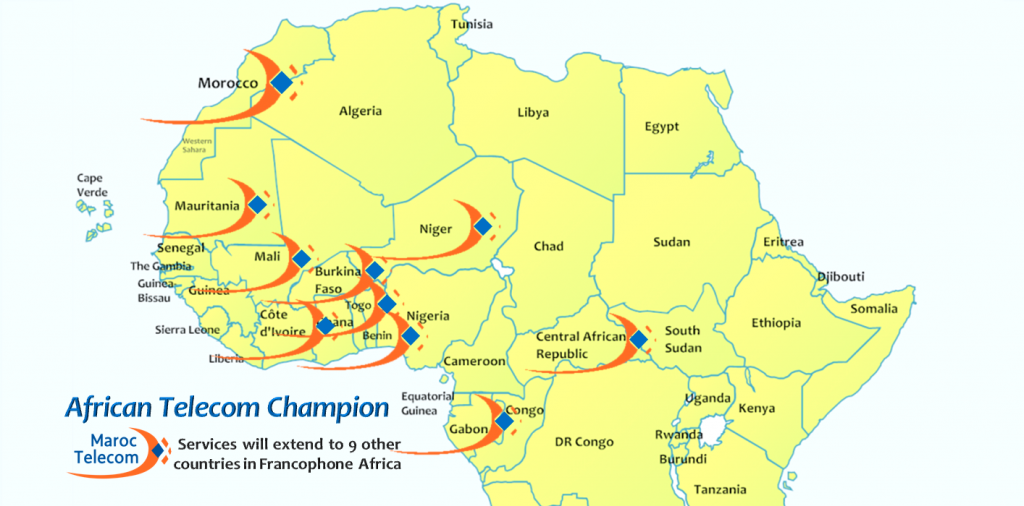Updated
Maroc Telecom More Than Doubles its Footprint in Africa – Jean AbiNader

The finalized deal, valued at $650 million, gives Etisalat a much stronger foothold on the continent and a proven platform, in Maroc Telecom, for expanding its operations to 10 countries to compete with regional rivals for the growing telecoms and ITC business in sub-Saharan Africa. Map: MOTM
.
* Acquires six companies as part of Etisalat’s takeover strategy*
.

Jean R. AbiNader, Exec. Dir., Moroccan American Trade and Investment Center
Jean R. AbiNader, MATIC
May 16, 2014
In a blockbuster deal announced earlier this week, the UAE telecoms firm, Etisalat, which has just completed its purchase of Vivendi’s 53-percent share of Maroc Telecom, sold its existing African operations to Maroc Telecom. For the Moroccan company, this adds Benin, Central African Republic, a second company in Gabon, Ivory Coast, Niger, and Togo to its operations in Morocco, Mauritania, Burkina Faso, Gabon, and Mali. For Etisalat, this consolidates their West African operations under one entity, another indicator that investors increasingly rely on Moroccan expertise to manage projects throughout Francophone Africa.
The deal, valued at $650 million, gives Etisalat a much stronger foothold on the continent and a proven platform, in Maroc Telecom, for expanding its operations further to compete with regional rivals for the growing telecoms and ITC business in sub-Saharan Africa. Etisalat’s acquisition of Maroc Telecom from Vivendi for $5.7 billion and the sale of its Africa operations in advance of the takeover of Maroc Telecom allow it to now control companies in 10 countries for the price it paid for Maroc Telecom’s ownership of its five existing operations.
Sanyalaksna Manibhandu, an analyst at NBAD Securities in Abu Dhabi, told Bloomberg, “It really makes sense they’re doing this. It’s a move to consolidate control of their west African assets as they obviously think Maroc Telecom can manage them better out of Casablanca better than they can out of the U.A.E.” In a related commentary carried on Forbes.com, Abdel Malek Alaoui noted, “There are obvious business consolidation and rationalization benefits to both companies as Maroc Telecom’s Middle East partner makes no bones about wanting to snap up state-owned incumbents as well as expand its mobile licenses in West Africa.”
He added, “Moreover, the Emirates and Morocco both have THE same goal: contribute to the security and stability of the Sahel and generate economic growth in a large zone ranging from the Atlantic Ocean to the Red Sea… Both countries share the same general views about religion, and have a moderate, tolerant practice of Islam. Both are also pretty aggressive business-wise. Although it does not have oil or natural resources except phosphates, Morocco launched in the mid 90’s an external business policy aimed at Africa entitled ‘economic diplomacy,’ and Moroccan groups have since increased market share in telecoms, banking, insurance, and IT. In 2013, Morocco became the second largest investor in the rest of Africa behind China.”
In yet another nod to Morocco’s growing international business prowess, Frédéric Ichay, a Paris-based lawyer who specializes in telecommunications and energy mergers opined that “this kind of restructuring is not unusual but it is interesting to see that for Etisalat, its investment arm in West Africa is going to be Maroc Telecom.”
As Mr. Alaoui concluded in this commentary, “Building bridges with the Middle East and investing in south-south partnerships with Africa is no new policy for Morocco. It’s rather one of the pillars of the strategy pursued by the Moroccan Monarch for years.” So for those commentators who question Morocco’s capacity to serve as a platform for greater business in Africa, Etisalat is providing a $5.7 billion answer.
Jean R. AbiNader is Executive Director of the Moroccan American Trade and Investment Center.